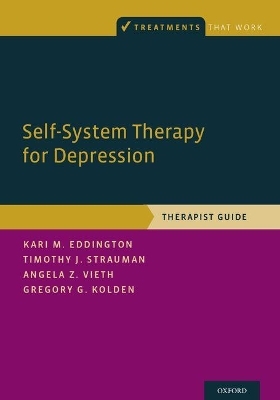
Self-System Therapy for Depression
Oxford University Press Inc (Verlag)
978-0-19-060251-2 (ISBN)
Depression is one of the most common forms of psychological distress and can have devastating consequences for individuals and their loved ones. Decades of research have shown that there are many possible causes of depression, and one of those causes involves problems with self-regulation. Self-regulation involves setting and pursuing important personal goals - put simply, the process of trying to be the kind of person you want to be.
Self-System Therapy for Depression: Therapist Guide provides a thorough description of Self-System Therapy (SST)-a motivational approach to treating depression that helps decrease feelings of disappointment and failure and increase feelings of pride and accomplishment, by improving the process of self-regulation. Clinical studies have shown that SST is effective in reducing depression and anxiety. The treatment program is structured within a 16-session plan, and strategies and techniques for each phase of treatment are presented in detail, along with case vignettes and examples. The core strategies of SST focus on identifying appropriate and reasonable personal goals and standards (including coping with perfectionistic standards), evaluating and improving the effectiveness of goal pursuit strategies, and adjusting goals in order to improve opportunities for positive emotions. The accompanying Client Workbook explains the basics of self-regulation in simple terms and provides worksheets to help illustrate and implement these strategies.
Kari M. Eddington, PhD, is a clinical psychologist, Associate Professor of Psychology, and Director of the Depression Treatment and Research Program at the University of North Carolina at Greensboro. Her research focuses on motivational factors in depression. Timothy J. Strauman, PhD, is Professor of Psychology and Neuroscience and Professor of Psychiatry and Behavioral Sciences at Duke University. Dr. Strauman is a clinical psychologist who translates behavioral science and brain science research into treatments and preventive interventions for mental disorders. His recent research includes development of self-system therapy; combining psychotherapy and transcranial magnetic stimulation to create more effective treatment options for depression; exploring the emergence of gender differences in depression; and creating a self-regulation model for vulnerability to depression. Angela Z. Vieth, PhD, is a Visiting Assistant Professor and the Associate Director of Undergraduate Studies for Psychology at Duke University. She earned her MA and PhD in Clinical Psychology from the University of Missouri-Columbia, and completed postdoctoral work at the University of Wisconsin-Madison and Duke University. Her research and teaching interests lie on the border between clinical and social psychology. Gregory G. Kolden, PhD, is Professor of Psychiatry and Psychology at the University of Wisconsin-Madison, Director of the Psychology Training Program, and Chief Psychologist. Dr. Kolden's research has focused on the evaluation of efficacy of behavioral interventions and the mechanisms underlying the changes that result from these treatments in psychiatric (e.g., mood-disordered outpatients) and medical populations. His work includes meta-analytic examination of psychotherapy relational elements and the use of structural equation modeling to examine the role of nonspecific therapeutic change processes (e.g., aspects of the therapy relationship) in empirically supported treatments.
Part I: Background for the Therapist
Chapter 1: Introduction to This Guide
Chapter 2: Theoretical Overview
Chapter 3: Is SST Right for My Client?
Chapter 4: Overview of SST Strategies
Part II: Therapy Phases and Strategies
Chapter 5: Orientation Phase (Sessions 1 - 4)
Chapter 6: Exploration Phase (Sessions 5 - 8)
Chapter 7: Adaptation Phase (Sessions 9 - 15)
Chapter 8: Termination and Relapse Prevention
| Erscheinungsdatum | 29.01.2018 |
|---|---|
| Reihe/Serie | Treatments That Work |
| Verlagsort | New York |
| Sprache | englisch |
| Maße | 175 x 249 mm |
| Gewicht | 299 g |
| Themenwelt | Sachbuch/Ratgeber ► Gesundheit / Leben / Psychologie ► Psychologie |
| Geisteswissenschaften ► Psychologie ► Angst / Depression / Zwang | |
| Geisteswissenschaften ► Psychologie ► Klinische Psychologie | |
| Medizin / Pharmazie ► Gesundheitswesen | |
| Medizin / Pharmazie ► Medizinische Fachgebiete ► Psychiatrie / Psychotherapie | |
| ISBN-10 | 0-19-060251-1 / 0190602511 |
| ISBN-13 | 978-0-19-060251-2 / 9780190602512 |
| Zustand | Neuware |
| Haben Sie eine Frage zum Produkt? |
aus dem Bereich


